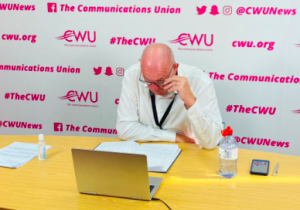Trade unions and Labour – working together to win a New Deal
September 21 2020Our general secretary Dave Ward called for key workers to be given “a proper pay rise” and for the needs of society to come above the greed of the market in a powerful contribution to the Labour Connected online event this afternoon.
As a panel member of the Jobs, jobs, jobs – what is the future of work? discussion, Dave was joined by fellow trade unionists Len McLuskey, Joanne Cairns and Sue Harris from the Unite, Usdaw and GMB unions respectively.
New Statesman political correspondent Ailbhe Rhea chaired the session, which was also joined by Labour frontbenchers Andy McDonald (Shadow Employment Rights Secretary) and Jonathan Reynolds (Shadow Work & Pensions Secretary) and gender equality and human rights consultant Mary-Ann Stevenson.
The Covid crisis, coming on top of already existing world-of-work trends places the UK at risk of “the biggest threat to jobs in our lifetime,” said Dave, who stressed that post-pandemic planning and workplace automation must be “handled the right way.”
Workers must be protected from job losses and also be given fair reward for their efforts, he insisted and “trade unions, working with Labour, can play the major role in making this happen” and in achieving the New Deal that workers need and deserve.
Mr McCluskey, Unite general secretary, strongly supported Dave’s and the CWU’s New Deal demand and emphasised the “urgency” of the current situation, with the existing Job Protection Scheme die to end soon.
Employers seeking to take advantage of the economic situation using the cynical “fire and rehire” tactic were strongly condemned and the Unite leader praised Labour Party leader Keir Starmer for his robust stance against this practice, over which his union had “pushed back” against British Airways.

GS Dave Ward
“Trade unions are the very people who speak for working-class communities,” he said, adding: “We’re the largest voluntary organisation in the UK.”
Joanne Cairns spoke of the grave difficulties facing retail workers, many of whom have worked throughout the Covid period, keeping the UK supplied with food and essentials. But yet insecure employment, such as zero-hour and short-time working remain acute problems in this sector – and many parts of retail have seen massive job losses.
MPs Mr McDonald and Mr Reynolds gave their backing to the demand for job protections and increased pay for Britain’s workers, also citing Labour’s three-point plan on jobs, training and businesses.
Trade unions and the Labour Party working together in a common aim was essential to achieve fairness and justice, they both insisted, praising the work of the movement and the dedication of union representatives during this extremely challenging time.
With regard to Dave’s challenge on the New Deal for Workers issue, Mr McDonald strongly agreed with the specific call for sector-wide standards to be established on pay, terms and conditions – citing the care sector as an example where this would be particularly helpful.
Mary-Ann Stevenson highlighted the impact of the current crisis on women in particular, explaining that many of the hardest-hit parts of our economy are also areas where women are traditionally employed and she pointed to the care sector as one where new jobs can and should be created – to meet the direct needs of the people.
Sue Harris made an important point about the insecure employment models that have become so prevalent over the past couple of decades.
There was nothing new about zero-hour contacts and short-time working, she told the panel, citing the experiences of her own grandfather who used to queue every morning for dock-work unloading ships for a day’s pay at a time.
In their closing statements, we heard strong calls from panel members, Ms Cairns taking the opportunity to praise Usdaw shop stewards who had, she said: “Done an amazing job.”
“The importance of unions in this crisis has been clear – but are are millions in unorganised workplaces and we’ve got to aim to make all workplaces organised.”
Mr McCluskey compared the current situation to the post-WWII scenario and reminded us all that our Labour Party won that 1945 election because we had a serious plan for the future.
“I’d say to Labour, be bold, Be brave.”
Dave called on everyone to “get behind” Labour’s job protection and recovery plan and urged the party and activists to “set it out clearly.”
Issues of pay and reward for key workers must be “based on what society needs, not ‘market values’,” he insisted, adding that our movement must unite to build a better society, “based on our values of equality, universalism and collectivism.”
And the last word of the session came from Mr Reynolds, who ended the discussion on an optimistic note, saying that, “out of crises come settlements” and that the party and the union movement working together was the way to achieve the best future settlement for the people.
–
Labour’s plan to recover jobs, retrain workers & rebuild business
Shadow Chancellor Annaliese Dodds set out Labour’s alternative economic agenda in detail today, when she explained the party’s key demands in her keynote speech of the Connected event.
Opening with warm praise for the nation’s key workers, Ms Dodds said they had “moved mountains over the past months” and deserved the sincere thanks of everyone they’ve served.
But despite the heroic efforts of workers, our country today “stands on the brink of even harder times” because of government failure.
This Tory government’s ineptitude and failure to “get a grip” on our public health crisis had been the direct cause of the economic crisis the UK was sliding into, she explained.
Examples our senior economic spokesperson cited of Tory government mistakes included “£130 million to a Conservative Party donor for testing kits that were unsafe, £150m for face masks that couldn’t be used and £2.6bn in ‘job retention bonuses’ to companies who were going to bring their staff back anyway.”
It was a “file of failure,” according to Ms Dodds, who slammed the government’s procurement policies as “wasteful” and the pattern of “outsourced contract after outsourced contract.”
Britain had the “worst excess death rate in Europe,” as well as the “deepest recession” and “slowest recovery,” she told the audience.
By contrast, Labour has a serious plan “recover jobs, retrain workers and rebuild business.”
The Job Recovery Scheme would support and enable companies in key sectors to bring workers back on reduced hours with government paying wages for the rest of the week.
“This would incentivise companies to bring back more workers part-time, instead of bring some back full time and letting others go,” our Shadow Chancellor pointed out.
Under this plan, government would work with trade unions and businesses to identify those sectors hardest hit by the crisis and most essential to our economic future – and secure those jobs.
On retraining, businesses would be incentivised to offer high-quality training for their staff – “but it won’t be a blank cheque.”
Government financial support for these training programmes would be “conditional on pledges to treat their workers decently and pause dividend payments for the duration of the scheme.”
And the business rebuilding plan would also target sectors particularly important to the economy – including small businesses and local economies.
–
Electric cars, freight and aviation
Shadow Business Secretary Ed Miliband led an evening debate on Labour’s Plan for a Green Recovery, which also included Unite assistant general secretary Steve Turner and train drivers’ union ASLEF general secretary Mick Whelan.
Among several interesting points Mr Miliband made was the need to ensure that the ‘green’ choice is also the ‘economic’ choice – in one example, citing the high costs of electric cars as opposed to petrol or diesel.
“By the mid 2020s, the lifetime cost of electric cars will be the same as petrol cars, but, for the car consumer, the upfront costs of electric is greater than fuel.
“Can we – government – make this conversion a better economic option for people?” He asked.
Bridget Phillipson, MP for Houghton & Sunderland South, highlighted an example of targeted investment working successfully in the case of the Nissan lithium-ion battery plant in Sunderland.
She emphasised the need for government to intervene and to assist, but to ensure that this public expenditure is appropriately targeted and conditioned.
Mick Whelan brought up the important question of moving more freight by rail – which currently transports only 10 per cent of the total – while Steve Turner highlighted the importance of the aviation sector to the UK economy and to jobs.
Unite members, as well as making up a significant proportion of the aviation workforce, are also the largest group of union members in aerospace and avionics and it is these members who are currently working on aviation-decarbonising projects in companies such as GE and Airbus, he told the discussion.
Guardian economics correspondent Richard Partington chaired this discussion, which also included panelists from the Common Wealth and the New Economics Foundation.
–
Around the event
Many other subjects and topics were discussed today, which also included a New Member Coffee Morning and a Be a Local Councillor training session.
Rebuilding our Communities was led by our Shadow Housing Secretary Thangham Debbonaire, who told her audience that Labour are the party which is “on the people’s side,” while MP Jim McMahon stressed: “We’ve got to give local government the resources to plan properly.”
Deputy Labour leader Angela Rayner headed a discussion all about Campaigning in the New Normal – an enthusiastic session which Angela said had “been incredibly valuable.
“The power of being part of this family, this movement really encourages me,” she enthused.
–



